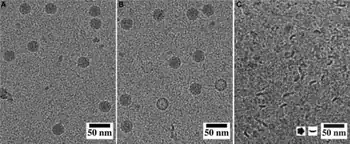Saffold virus
| Saffold virus | |
|---|---|
| Virus classification | |
| (unranked): | Virus |
| Realm: | Riboviria |
| Kingdom: | Orthornavirae |
| Phylum: | Pisuviricota |
| Class: | Pisoniviricetes |
| Order: | Picornavirales |
| Family: | Picornaviridae |
| Genus: | Cardiovirus |
| Species: | Cardiovirus D |
| Virus: | Saffold virus |
Saffold virus (SAFV) is a single-stranded RNA human virus belonging to the family Picornaviridae. Discovered in 2007, it is the first human virus in the genus Cardiovirus and may provide a link to the development of multiple sclerosis or other serious diseases in humans.[1]
The Saffold virus was previously a member of the Theilovirus species but was re-classified in 2019 as an isolate of the species Cardiovirus D. It has shown to affect the gastrointestinal tract and respiratory systems, and is found to be present early in life.[2]
Strains

Eights strains of SAFV have been identified; these are named SAFV-1 through SAFV-8.[2][3] Of these strains, SAFV-1 has a global distribution. The other strains have only been isolated from specific locations.[2]
Structure
SAFV is composed of 8050 nucleotide long single-stranded RNA, and in diameter is 30 nm long icosahedral shaped capsid.[2][4] Contained on both the 3' and 5' ends of the strand are untranslated regions (UTR) with the 5' UTR side being 1040 nucleotides (nt) long and the 3' side being 120 nt long.[2][4] A poly(A) is located on the 3'UTR side, and contained on the 5'UTR side are internal ribosome entry sites (IRES).[2][4]
Discovery
SAFV was discovered by Morris S. Jones in 2007 while working at the David Grant USAF Medical Center in the United States.[5] The virus was isolated from a stool sample taken in November 1981 from an 8-month-old female with fever of unknown origin.
This is the first human virus in the genus Cardiovirus. Found to occur in high prevalence (>90%) among humans, by analogy SAFV may have effects similar to those observed in mouse TMEV-induced encephalomyelitis, in terms of catalyzing the development of human multiple sclerosis or other serious diseases following infection early in life.[1]
See also
References
- 1 2 Kirkegaard, Karla; Zoll, Jan; Erkens Hulshof, Sandra; Lanke, Kjerstin; Verduyn Lunel, Frans; Melchers, Willem J. G.; Schoondermark-Van De Ven, Esther; Roivainen, Merja; Galama, Jochem M. D. (2009). Kirkegaard, Karla (ed.). "Saffold Virus, a Human Theiler's-Like Cardiovirus, is Ubiquitous and Causes Infection Early in Life". PLOS Pathogens. 5 (5): e1000416. doi:10.1371/journal.ppat.1000416. PMC 2670511. PMID 19412527.
- 1 2 3 4 5 6 Himeda, Toshiki; Ohara, Yoshiro (February 2012). "Saffold Virus, a Novel Human Cardiovirus with Unknown Pathogenicity". Journal of Virology. 86 (3): 1292–1296. doi:10.1128/JVI.06087-11. ISSN 0022-538X. PMC 3264344. PMID 22114344.
- ↑ Blinkova, Olga; Kapoor, Amit; Victoria, Joseph; Jones, Morris; Wolfe, Nathan; Naeem, Asif; Shaukat, Shahzad; Sharif, Salmaan; Alam, Muhammad Masroor; Angez, Mehar; Zaidi, Sohail (2009-05-01). "Cardioviruses Are Genetically Diverse and Cause Common Enteric Infections in South Asian Children". Journal of Virology. 83 (9): 4631–4641. doi:10.1128/JVI.02085-08. ISSN 0022-538X. PMC 2668475. PMID 19193786.
- 1 2 3 Tan, Shawn Zheng Kai; Tan, Mark Zheng Yi; Prabakaran, Mookkan (January 2017). "Saffold virus, an emerging human cardiovirus". Reviews in Medical Virology. 27 (1): e1908. doi:10.1002/rmv.1908. ISSN 1052-9276. PMC 7169152. PMID 27723176.
- ↑ Jones, MS.; Lukashov, VV; Ganac, RD; Schnurr, DP. (July 2007). "Discovery of a novel Human Picornavirus in a stool sample from a pediatric patient presenting with fever of unknown origin". Journal of Clinical Microbiology. 45 (7): 2144–50. doi:10.1128/JCM.00174-07. PMC 1933019. PMID 17460053.